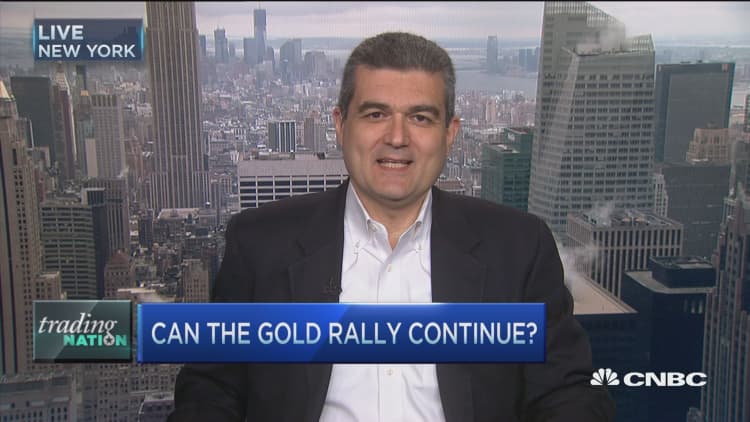
Gold prices have risen nicely this year, but market history suggests that those expecting further gains will be badly disappointed, Oppenheimer technical analyst Ari Wald warns.
"It's time to take profits in gold," Wald wrote to CNBC on Monday.
For the technician, gold's recent breach of its long-term downtrend calls to mind 1999, when gold rose powerfully in a short period of time to break out of a period of progressively lower prices.
"While that certainly set up a better trading environment, it wasn't off to the races in 1999," Wald said.
A similar chart pattern has unfurled itself this time around, Wald says. Consequently, he expects only mild gains at best for the yellow metal in remainder of the year.
"There are signs of selling pressure at $1,280," Wald said, referring to a level just $35 above Monday afternoon's settlement price.
Still, he's not exactly bearish on gold, either — pointing to support on the chart just below $1,200.
On the other hand, for Boris Schlossberg of BK Asset Management, the current environment strongly favors owning gold.
"The single biggest knock on gold is the fact that gold doesn't yield anything. But in a day and age where cash doesn't yield anything, gold looks very, very attractive, and I think that's why you're seeing this very strong bid underneath gold," Schlossberg said Monday on CNBC's "Power Lunch."
Specifically, Schlossberg would recommend buying the popular SDPR gold ETF (GLD), which has seen massive inflows this year.
Read More Gold funds become the 'gorilla' of the ETF market
Of course, some suggest buying the physical metal rather than the ETF — reasoning that this better protects an investor from a major financial meltdown or zombie attack, either of which could negatively impact market liquidity. But Schlossberg says such reasoning is flawed.
"If you have a zombie attack, at that point, your investment in gold is the least problem you have in the basket," the currency strategist predicted.






